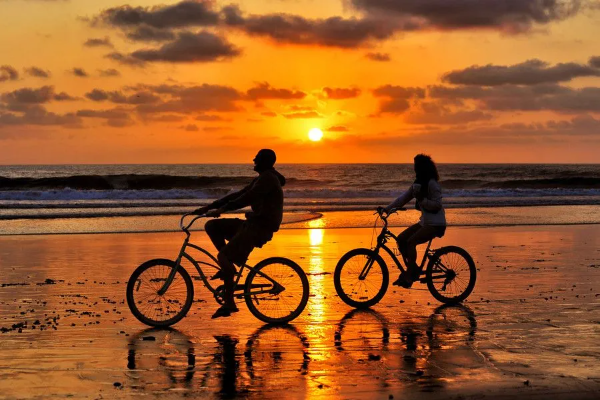Mountain bikes are specially designed for off-road cycling, known for their sturdy frames, wide tires with deep tread patterns, and suspension systems that absorb shock on rough terrain. They’re versatile, built to handle various conditions from dirt trails to rocky paths.
Beach Riding Considerations
Riding a mountain bike on the beach presents unique challenges. Soft sand can make pedaling difficult, requiring more effort and technique. Wind can affect stability, and tides can change the terrain dramatically.
Tire Selection
Choosing the right tires is crucial for beach riding. Wider tires with low pressure offer better traction on soft surfaces, enhancing stability and control. Tread patterns designed for loose terrain are beneficial.
Bike Setup
Optimizing your bike setup for beach riding involves adjusting suspension settings to absorb bumps without losing momentum. Lowering gears can help maintain speed in soft sand, while maintaining proper tire pressure is key to maximizing grip.
Safety Precautions
Safety is paramount when beach riding. Wear a helmet and other protective gear. Stay mindful of pedestrians and beachgoers, and watch out for obstacles like rocks or debris hidden in the sand.
Benefits of Beach Riding
Beach riding offers more than just a scenic workout. It improves cardiovascular health, strengthens muscles (especially in the legs and core), and provides a mental boost from being outdoors in a natural setting.
Riding a mountain bike on the beach can offer many benefits, including improved cardiovascular health, strengthened muscles, and increased mental well-being. Popular beach riding destinations include coastal areas with wide, flat beaches and scenic views. You can also join local cycling groups or clubs to connect with other riders and explore new routes.
See Also: the Best Bikes for Trail Riding: A Comprehensive Guide
Popular Beach Riding Destinations
Explore renowned beach riding spots like coastal trails in California or sandy stretches in Florida. Join local cycling groups or clubs for community rides and insider tips on the best routes.
Riding Techniques
Mastering beach riding techniques involves maintaining momentum through soft sand by pedaling smoothly and evenly distributing your weight. Proper body positioning—leaning back slightly with elbows bent—helps maintain balance and control.
Mountain biking is a popular sport that involves riding bikes designed for off-road terrain. These bikes are built to handle rough terrain, steep inclines and declines, and other challenging conditions. But can you ride a mountain bike on the beach? The answer is yes, but there are some things to consider before hitting the sand.
1. it’s important to understand that the beach presents unique challenges for mountain biking. The soft sand can make it difficult to maintain traction and control your speed, while wind and tides can also affect your ability to ride smoothly. Additionally, the salty air and sand can corrode and damage your bike over time.
2. To prepare for beach riding, it’s important to choose the right tires. Wider, lower-pressure tires provide better traction and stability on soft surfaces like sand. You may also want to adjust your bike’s suspension, gearing, and other settings to optimize performance on the beach.
3. Safety is also a concern when riding a mountain bike on the beach. Be sure to wear protective gear such as a helmet, gloves, and eye protection. It’s also important to be aware of pedestrians and other beachgoers, as well as any potential hazards like rocks or debris.
Conclusion
Riding a mountain bike on the beach is a rewarding experience that combines fitness with nature’s beauty. By understanding the challenges, optimizing your bike setup, and practicing safe riding habits, you can enjoy this unique cycling adventure to the fullest.
When riding a mountain bike on the beach, it’s important to maintain momentum through soft sand and use proper body positioning for balance and control. With the right preparation and precautions, beach riding can be a fun and rewarding activity for mountain bikers of all levels.
FAQ: Can You Ride a Mountain Bike on the Beach?
Q: Can I ride my mountain bike on the beach?
A: Yes, you can ride your mountain bike on the beach. However, it’s important to be aware of the challenges and hazards that come with riding on sand.
Q: What are some challenges of riding a mountain bike on the beach?
A: Some challenges of riding a mountain bike on the beach include soft sand, wind, and tides. Soft sand can make it difficult to maintain traction and control your speed, while wind and tides can affect your ability to ride smoothly. Additionally, the salty air and sand can corrode and damage your bike over time.
Q: What kind of tires should I use for beach riding?
A: Wider, lower-pressure tires are best for beach riding as they provide better traction and stability on soft surfaces like sand. It’s also a good idea to adjust your bike’s suspension, gearing, and other settings to optimize performance on the beach.
Q: Are there any safety concerns when riding a mountain bike on the beach?
A: Yes, there are safety concerns when riding a mountain bike on the beach. Be sure to wear protective gear such as a helmet, gloves, and eye protection. It’s also important to be aware of pedestrians and other beachgoers, as well as any potential hazards like rocks or debris.
Q: What are some benefits of riding a mountain bike on the beach?
A: Riding a mountain bike on the beach can offer many benefits, including improved cardiovascular health, strengthened muscles, and increased mental well-being. Popular beach riding destinations include coastal areas with wide, flat beaches and scenic views. You can also join local cycling groups or clubs to connect with other riders and explore new routes.
Q: How do I ride a mountain bike on the beach?
A: When riding a mountain bike on the beach, it’s important to maintain momentum through soft sand and use proper body positioning for balance and control. With the right preparation and precautions, beach riding can be a fun and rewarding activity for mountain bikers of all levels.


